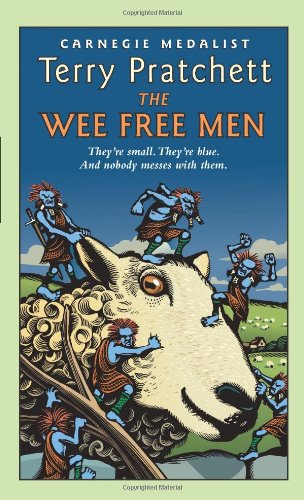All Nonfiction
- Bullying
- Books
- Academic
- Author Interviews
- Celebrity interviews
- College Articles
- College Essays
- Educator of the Year
- Heroes
- Interviews
- Memoir
- Personal Experience
- Sports
- Travel & Culture
All Opinions
- Bullying
- Current Events / Politics
- Discrimination
- Drugs / Alcohol / Smoking
- Entertainment / Celebrities
- Environment
- Love / Relationships
- Movies / Music / TV
- Pop Culture / Trends
- School / College
- Social Issues / Civics
- Spirituality / Religion
- Sports / Hobbies
All Hot Topics
- Bullying
- Community Service
- Environment
- Health
- Letters to the Editor
- Pride & Prejudice
- What Matters
- Back
Summer Guide
- Program Links
- Program Reviews
- Back
College Guide
- College Links
- College Reviews
- College Essays
- College Articles
- Back
The Wee Free Men by Terry Pratchett
This book is not a summer book (slightly trashy fast-paced fiction to read by the pool) or a winter book (perfect for a rainy day-long and slow with lots of details) but an all-year-round book. The 30th book in Terry Pratchett's Discworld series and first Tiffany Aching novel, The Wee Free Men features a nine-year-old farm girl named Tiffany who is good with cheese. Tiffany, however, is not demure or meek in any way-she spots a giant monster in the river near her house one day, and instead of running away, she goes back home to fetch a frying pan. She then lures the monster out of the water using her little brother as bait and "clangs" the monster on the head with the pan. A witch named Miss Tick, who has been watching Tiffany and her frying pan through the first few chapters, informs us that another world is colliding with Tiffany's, and Miss Tick leaves to fetch help. She leaves her talking toad behind to watch over Tiffany, who refuses to be watched over: The toad soon tells her all about the colliding of the worlds, and introduces her to the mysterious red-headed creatures who've been popping up all over Tiffany's path in the past few weeks. The Nac Mac Feegle, or Wee Free Men, are 6-inch-tall, blue-skinned, kilt-wearing warriors. They were kicked out of fairyland for being disruptive and drunk, and are now wreaking unrestrained (though curiously moral) havoc on the rest of the world. Or worlds, as we soon find out.
After the Queen of Fairies (who personally ejected the Wee Free Men from her kingdom) kidnaps Tiffany's brother, the small but determined girl marches into Fairyland frying pan first, accompanied by the toad, her mother's trusty book Diseases of the Sheep, and large group of Feegles.
Along with the Wee Free Men comes "drinking, fighting, and stealing". There's a bit of swearing, but as it's all in either Toad ("croap") or a vaguely Scottish dialect ("crivens!"), you needn't worry about younger readers. Although the Feegles do steal anything and everything in sight, they're good-hearted and never steal from anyone in need. It appears that all Feegles are alcoholic, yet this fact is treated with indifference by Tiffany and the third-person narration: Drinking is not encouraged, but neither is it portrayed in a negative light. However, most readers that would enjoy the book are old enough to make their own judgements concerning the alcohol level of the little blue men. Terry Pratchett's writing is highly entertaining for all readers, and the older you are the more you'll laugh.
Other things I liked about this book:
The asterisks. At the end of the page you'll often find a * accompanied by a hilarious notation or fictional anecdote.
The frequent sarcasm-I'm a very sarcastic person myself, and Terry Pratchett uses it frequently but not enough to wear it out.
The sequels! A Hat Full of Sky and Wintersmith, telling of an eleven- and thirteen-year-old Tiffany's adventures, are every bit as witty and captivating as the last. I just discovered a third sequel, I Shall Wear Midnight (released in 2010), and am planning on reading it on Tuesday. (Yes, the whole thing.)
Stephen Brigg's narration of the book is even more hilarious than the print version: although the Feegles' speech is a little hard to understand at first, you'll grow to love the Scottish-accented sound of frying pan hitting everything in sight.
Although the book has a female protagonist, there are many strong characters of both sexes (and weaker ones as well). Humanity is humorously and accurately portrayed by the author.
Similar Articles
JOIN THE DISCUSSION
This article has 0 comments.

